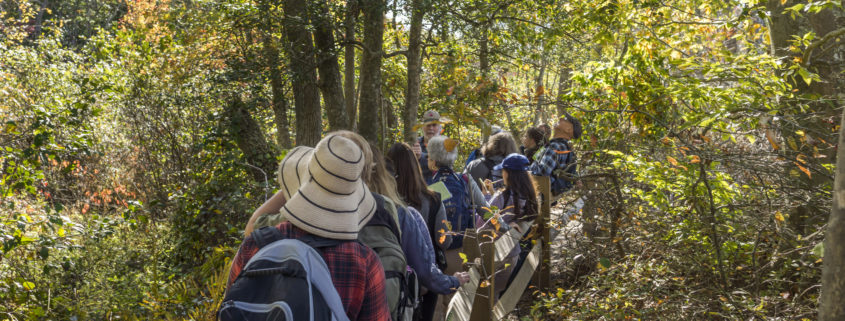Look what you’ve done!
by Michael Reinemer
As I sign off as president, passing the baton to Joe Gorney, I want to thank each Virginia Master Naturalist in the chapter for what you do. The numbers of volunteer hours are astounding.
It’s hard to overstate how desperately your hours and your expertise are needed. Fairfax County and the whole region suffer from habitat loss, climate change, pollution, fragmentation, overuse – among many other assaults.
Meanwhile, we humans are increasingly disconnected from nature, suffering from the “landscape amnesia” Pete Mecca describes to FMN classes. Or shifting baseline syndrome: It’s impossible to notice the many gradual declines in the natural world – unless you understand the natural world, and you care about it and you actively monitor it. Which is one of the things you do as master naturalists. The statewide mason bee monitoring project is a great example.
You may have read “The Insect Apocalypse Is Here,” the cover story by Brooke Jarvis in the New York Times Magazine, Nov. 27, 2018. The now global, scientific alarm about loss of insect diversity and abundance was triggered in part by small bug club in Germany. That club of 63 amateur naturalists, which included a few with science backgrounds, documented an astounding 80 percent drop in insect numbers in their research plot over a 30-year period. They had been consistently monitoring and recording changes in insect numbers or biomass in addition to species.
What’s the big deal? As E.O. Wilson put it, “If all mankind were to disappear, the world would regenerate back to the rich state of equilibrium that existed ten thousand years ago. If insects were to vanish, the environment would collapse into chaos.” While the “10,000 years” part is probably optimistic, the role of decomposers, pollinators, and other insects is indisputable.
In her NYT piece, Jarvis talks about the long amateur naturalist tradition in Europe and how that has figured into faster, more aggressive response to the insect apocalypse there, compared to the U.S.
So as part of the growing master naturalist movement in the U.S., you are a vital resource in this era of shrinking budgets for conservation and a time of overt hostility toward science in some quarters of the federal government. Your work as monitors, mentors, and stewards is invaluable.
While all the 2018 numbers aren’t in yet, look what you’ve done:
680 hours staffing information desks at nature centers
445 hours working on nature programs for the county
435 hours removing invasive plants
375 hours as Audubon at Home ambassadors, assessing wildlife habitat
360 hours for the Cornell Lab of Ornithology feederwatch program
350 hours managing habitat and land for Fairfax County Park Authority
343 hours for school programs for Fairfax County Park Authority
330 hours for citizen science programs for the park authority
267 hours monitoring trails for Virginia Bluebird Society
260 hours working with the Plant NoVA Natives campaign
That’s just a small snapshot of your amazing numbers and work. Congratulations, and thank you.
And a hearty thanks to the many volunteer leaders who serve as officers, committee chairs, and committee members who manage the training and all the mechanics that make the Fairfax Master Naturalists the force for nature that it is.





Great article and tribute to the passion and hard work from Master Naturalists! Thanks for your leadership Michael.
With hope for the new year, Laura